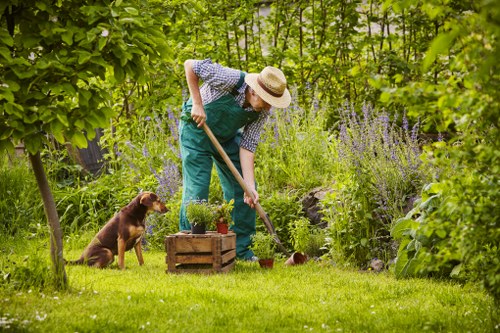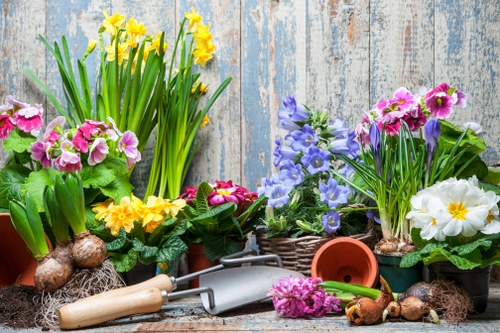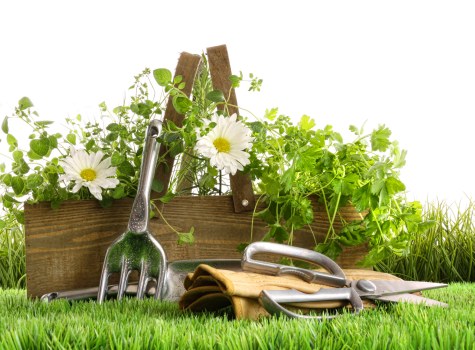Comprehensive Guide to Garden Maintenance in Chiswick

Introduction to Garden Maintenance
Maintaining a beautiful garden in Chiswick requires regular attention and care. Whether you have a sprawling estate or a cozy backyard, proper garden maintenance ensures that your outdoor space remains vibrant and healthy throughout the year. From planting and pruning to fertilizing and pest control, each aspect plays a crucial role in the overall aesthetics and functionality of your garden.
Chiswick's unique climate and soil conditions necessitate specific gardening techniques tailored to the local environment. Understanding the seasonal changes and how they affect your garden can help you plan effectively and achieve the best results. This guide will provide you with essential tips and strategies to keep your garden in Chiswick thriving.
In addition to enhancing the beauty of your property, a well-maintained garden can increase your home's value and provide a peaceful retreat from the hustle and bustle of daily life. Investing time and effort into garden maintenance is not only rewarding but also beneficial for your overall well-being.

Seasonal Garden Maintenance
Spring Maintenance
Spring is a critical time for garden maintenance in Chiswick. As the weather warms up, it's essential to prepare your garden for the growing season. Start by clearing out any debris from the winter months, such as fallen leaves and dead plant material. This cleanup helps prevent pests and diseases from taking hold.
Planting early in the spring allows your flowers and vegetables to establish themselves before the heat of summer. Consider planting a mix of perennials and annuals to ensure year-round color and interest. Additionally, fertilizing your soil can provide the necessary nutrients for your plants to thrive.
Pruning is another important task in the spring. Removing dead or damaged branches from trees and shrubs promotes healthy growth and improves the overall structure of your plants. Proper pruning also enhances light penetration and air circulation, reducing the risk of fungal diseases.
- Clear debris and dead plant material
- Plant a mix of perennials and annuals
- Fertilize the soil
- Prune trees and shrubs

Summer Maintenance
Summer in Chiswick brings longer days and warmer temperatures, which can be both a boon and a challenge for your garden. Regular watering is crucial during this season, especially for newly planted flowers and vegetables. Drip irrigation systems can be an efficient way to ensure consistent moisture levels without overwatering.
Weeding becomes more difficult as weeds grow rapidly in the summer heat. Implementing a mulching strategy can help suppress weed growth and retain soil moisture. Organic mulches, such as wood chips or straw, also add nutrients to the soil as they decompose.
Pest control is another important aspect of summer garden maintenance. Keep an eye out for common garden pests like aphids, slugs, and caterpillars. Organic pest control methods, such as introducing beneficial insects or using natural sprays, are effective ways to manage pest populations without harming your plants.
- Ensure regular watering, preferably with drip irrigation
- Implement mulching to suppress weeds and retain moisture
- Monitor and manage pest populations
- Provide adequate ventilation for plants

Autumn Maintenance
As temperatures begin to cool, autumn is the perfect time to prepare your garden for the winter months. Start by harvesting any remaining vegetables and flowers, ensuring that your garden remains tidy. Clearing out spent plants reduces the risk of diseases overwintering in your garden beds.
Planting cover crops can help improve soil structure and fertility for the next growing season. Additionally, autumn is an ideal time for planting bulbs that will bloom in the spring, adding vibrant colors to your garden after the snow melts.
Raking leaves and composting them can provide valuable organic matter for your garden. Applying a layer of compost to your garden beds enriches the soil and enhances its ability to retain moisture and nutrients. This practice sets the stage for healthy plant growth in the upcoming year.
- Harvest remaining vegetables and flowers
- Plant cover crops and spring bulbs
- Rake and compost fallen leaves
- Apply compost to garden beds

Winter Maintenance
Winter may seem like a quiet time for your garden, but it’s essential to perform certain maintenance tasks to ensure your plants survive and thrive in the coming year. Start by protecting sensitive plants with mulch or frost blankets to shield them from harsh weather conditions.
Pruning deciduous trees and shrubs during the dormant winter months promotes healthy growth in spring. Remove any dead or diseased branches to prevent them from causing damage as new growth emerges.
Taking care of your garden tools during the winter is also important. Clean, sharpen, and store your tools properly to extend their lifespan and ensure they’re ready for use when the gardening season resumes.
- Protect sensitive plants with mulch or frost blankets
- Prune deciduous trees and shrubs
- Clean and store garden tools properly
- Plan your garden for the upcoming year
Essential Garden Maintenance Tasks
Keeping your garden in top shape involves a variety of maintenance tasks that must be performed regularly. From weeding and watering to pruning and fertilizing, each task contributes to the overall health and appearance of your garden.
Effective garden maintenance requires a combination of knowledge, dedication, and the right tools. Investing in high-quality gardening tools can make tasks easier and more enjoyable. Additionally, staying informed about the specific needs of your plants ensures that you provide the best care possible.
Implementing a regular maintenance schedule can help you stay organized and ensure that no tasks are overlooked. Whether you choose to maintain your garden yourself or hire a professional service in Chiswick, consistency is key to achieving a flourishing garden.
- Regular weeding to prevent competition for nutrients
- Consistent watering schedules based on plant needs
- Pruning to encourage healthy growth and shape plants
- Fertilizing to replenish soil nutrients
Choosing the Right Plants for Chiswick Gardens
Selecting the appropriate plants is fundamental to successful garden maintenance in Chiswick. Consider the local climate, soil type, and the amount of sunlight your garden receives when choosing plants. Native plants are often a smart choice as they are well-adapted to the local environment and require less maintenance.
Incorporating a variety of plant types can enhance the visual appeal and biodiversity of your garden. Combining annuals and perennials ensures continuous blooming and interest throughout the seasons. Additionally, incorporating shrubs and trees can provide structure and privacy to your outdoor space.
Don't forget to consider the maintenance requirements of each plant. Opting for low-maintenance varieties can save you time and effort in the long run. However, if you enjoy the process, cultivating a diverse range of plants can be a rewarding endeavor.
- Choose native and well-adapted plant species
- Incorporate a mix of annuals, perennials, shrubs, and trees
- Consider the maintenance needs of each plant
- Plan for year-round color and interest
Irrigation and Water Management
Proper irrigation is vital for maintaining a healthy garden in Chiswick. Understanding the water needs of your plants and implementing an efficient watering system can prevent overwatering and underwatering, both of which can be detrimental to plant health.
Drip irrigation systems are highly recommended as they deliver water directly to the plant roots, reducing water wastage and minimizing evaporation. Additionally, installing a rainwater harvesting system can provide a sustainable source of water for your garden, especially during dry spells.
Mulching plays a significant role in water management by retaining soil moisture and moderating soil temperature. Organic mulches, such as compost, bark, or straw, also contribute to soil fertility as they break down over time.
- Implement drip irrigation for efficient watering
- Consider rainwater harvesting systems
- Use organic mulches to retain soil moisture
- Monitor soil moisture levels regularly
Pest and Disease Management
Maintaining a garden free from pests and diseases is essential for the longevity and beauty of your plants. Regular inspections can help you identify early signs of infestation or illness, allowing you to take prompt action before problems escalate.
Employing integrated pest management (IPM) strategies can effectively control pest populations while minimizing environmental impact. This approach combines biological control methods, such as introducing beneficial insects, with cultural practices like crop rotation and proper sanitation.
Preventive measures, such as selecting disease-resistant plant varieties and maintaining healthy soil, are crucial for reducing the likelihood of pest and disease issues. Additionally, removing affected plant parts can prevent the spread of infections and promote overall plant health.
- Conduct regular garden inspections
- Implement integrated pest management strategies
- Use biological controls and natural remedies
- Maintain healthy soil and plant hygiene
Soil Health and Fertilization
Healthy soil is the foundation of a thriving garden in Chiswick. Regularly testing your soil can provide insights into its composition and nutrient levels, allowing you to make informed decisions about fertilization and soil amendments.
Incorporating organic matter, such as compost or well-rotted manure, improves soil structure, enhances nutrient availability, and fosters beneficial microbial activity. Additionally, using mulch helps prevent soil erosion and moisture loss, contributing to overall soil health.
Choosing the right fertilizer is crucial. Organic fertilizers release nutrients slowly, providing a steady supply of nourishment to your plants. Chemical fertilizers can offer a quick nutrient boost but should be used sparingly to avoid soil degradation and environmental harm.
- Conduct regular soil tests to assess nutrient levels
- Incorporate organic matter to enhance soil structure
- Use mulch to protect and enrich the soil
- Choose appropriate fertilizers based on plant needs
Pruning and Trimming Techniques
Pruning and trimming are essential practices for maintaining the shape, health, and productivity of your garden plants. Proper pruning techniques promote better air circulation, reduce disease risk, and encourage robust growth.
Different plants require different pruning methods. For instance, flowering shrubs often need to be pruned immediately after blooming to ensure they set buds for the next season. Conversely, certain trees benefit from winter pruning when they are dormant, allowing for easier identification of dead or diseased branches.
Regular trimming of hedges and topiaries maintains their desired shape and prevents overgrowth. Using sharp, clean tools is crucial to making precise cuts that minimize damage to the plants. Always follow proper pruning guidelines to avoid stressing your plants and to support their long-term health.
- Identify the specific pruning needs of each plant
- Use sharp and clean tools for precise cuts
- Prune at the appropriate time of year
- Maintain the desired shape and size of plants
Lawn Care and Maintenance
A well-maintained lawn serves as the centerpiece of many gardens in Chiswick. Regular mowing, aeration, and fertilization are key components of effective lawn care. Mowing should be done frequently enough to keep the grass at an optimal height, promoting thick and healthy growth.
Aerating your lawn annually helps relieve soil compaction, allowing air, water, and nutrients to penetrate deeply into the roots. This practice is particularly beneficial for high-traffic areas where soil tends to become compacted over time.
Fertilizing your lawn provides essential nutrients that support lush green growth. Selecting a balanced fertilizer that suits your grass type and soil condition ensures that your lawn remains resilient against pests and diseases.
- Mow regularly to maintain optimal grass height
- Aerate the lawn annually to reduce soil compaction
- Apply suitable fertilizers based on grass type
- Monitor for pests and diseases
Hardscaping and Garden Structures
Incorporating hardscaping elements into your garden can enhance its functionality and aesthetic appeal. Features such as patios, pathways, and garden walls provide structure and define different areas within your outdoor space.
Choosing the right materials for hardscaping is important for durability and aesthetics. Natural stone, brick, and wood are popular choices that complement various garden styles. Additionally, properly maintaining these structures ensures they continue to add beauty and functionality to your garden for years to come.
Garden structures like pergolas, arbors, and gazebos provide shade and shelter, creating inviting spaces for relaxation and social gatherings. Integrating these elements thoughtfully can transform your garden into a versatile and enjoyable environment.
- Incorporate patios and pathways for functionality and beauty
- Choose durable and complementary materials
- Maintain hardscaping structures regularly
- Add garden structures for shade and relaxation
Eco-Friendly Garden Practices
Adopting eco-friendly practices in garden maintenance contributes to environmental sustainability and promotes biodiversity. Utilizing organic fertilizers and pest control methods reduces the reliance on harmful chemicals, benefiting both your garden and the surrounding ecosystem.
Implementing water conservation techniques, such as rainwater harvesting and drip irrigation, minimizes water usage and ensures that your garden remains hydrated efficiently. Planting native species also supports local wildlife, providing habitat and food sources for beneficial insects, birds, and other creatures.
Composting kitchen and garden waste transforms it into valuable organic matter, enriching your soil and reducing landfill waste. Additionally, recycling materials for garden projects, like using reclaimed wood for raised beds, supports a sustainable gardening approach.
- Use organic fertilizers and natural pest control methods
- Implement water conservation techniques
- Plant native species to support local wildlife
- Compost and recycle garden waste
Hiring Professional Garden Maintenance Services
While DIY garden maintenance can be rewarding, hiring a professional garden maintenance service in Chiswick offers numerous benefits. Professionals bring expertise and experience, ensuring that your garden receives the best care possible. They can identify and address issues that may not be apparent to the untrained eye, such as soil deficiencies or early signs of plant diseases.
Professional services also save you time and effort, allowing you to enjoy your garden without the stress of ongoing maintenance tasks. From regular pruning and mowing to seasonal cleanups and landscape design, professionals handle all aspects of garden maintenance with efficiency and precision.
Choosing the right garden maintenance service involves considering their reputation, range of services, and understanding of local gardening conditions. Investing in a reputable service ensures that your garden remains healthy, beautiful, and a source of pride for years to come.
- Benefit from expert knowledge and experience
- Save time and reduce maintenance stress
- Ensure comprehensive care for all garden aspects
- Choose a reputable and reliable service provider
Conclusion: Maintaining a Thriving Garden in Chiswick
Maintaining a garden in Chiswick requires a blend of consistent care, knowledge of local conditions, and the right tools and techniques. By following the seasonal maintenance guidelines and implementing best practices, you can ensure that your garden remains lush, healthy, and visually appealing throughout the year.
Whether you choose to undertake garden maintenance yourself or enlist the help of professional services, the key to success lies in dedication and attention to detail. A well-maintained garden not only enhances the beauty of your home but also provides a serene environment where you can relax and connect with nature.
Embrace the joy of gardening in Chiswick by investing time and resources into proper garden maintenance. Your efforts will be rewarded with a stunning outdoor space that you can enjoy and take pride in for many years to come.
Contact us today to learn more about our professional garden maintenance services in Chiswick and start transforming your garden into a beautiful, thriving oasis.